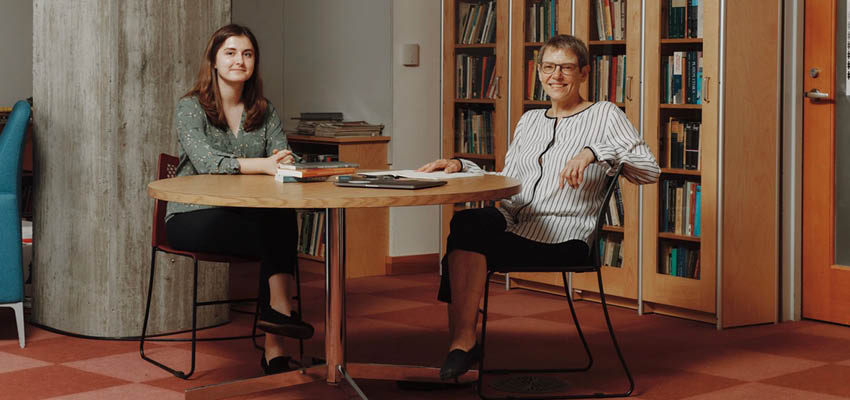
Renowned philosophy professor values the perspective of her young mentees
Original article on MIT Spectrum
By all accounts, Sally Haslanger is a great mentor.
“I work on topics that are of immediate social and political concern,” says Haslanger, the Ford International Professor of Philosophy and an affiliate in the Women’s and Gender Studies Program at MIT; she also teaches in MIT D-Lab. “It’s important to me to remain current, not just in the literature of philosophy, but also in how life unfolds for people of other generations. It’s really valuable for me to get their perspective.”
An MIT professor since 1998, Haslanger works on issues of social justice, along with epistemology, metaphysics, and the philosophies of language and mind. Deeply committed to promoting diversity in philosophy and beyond, she is best known for her work in feminist and critical race theory. At MIT, she is much sought after as a mentor.
“Sally is THE feminist philosopher,” says Eliza Wells, a fourth-year PhD student in philosophy and a Haslanger advisee. “I remember being nervous when I met her. But from the very beginning she made it clear she was invested in students. In the first course I took with her, an ‘analytic philosophy boot camp,’ she helped make us feel that the questions we were asking really mattered. I knew I wanted to work with her because I knew she cared about my growth.”
“You leave every conversation with her with new wind in your sails. She makes you feel like you can do this,” says Sonia Maria Pavel.
Third-year PhD student Sonia Maria Pavel, another Haslanger advisee, chose to pursue her doctorate at MIT largely because of Haslanger. “I’d heard her speak in Boston when I was an undergraduate at Brandeis,” says Pavel. “I applied to MIT so I could work with her. It was a bit intimidating at first, because she is such a prominent philosopher. But she is the most caring and thoughtful person I’ve met in the world of philosophy. She’s incredibly generous with her time. You leave every conversation with her with new wind in your sails. She makes you feel like you can do this.”
Born and raised in Romania, Pavel studies the political philosophy of education, a specialty not directly related to Haslanger’s field of study. “I remember one day, soon after I began working with her, I went to her office and found a huge stack of books on the political philosophy of education that she had bought to read,” says Pavel. “She is so busy, yet she took the time to delve into my subject so she could offer the best possible feedback.”
Wells, who studies ethics, and specifically how our social roles impact our moral reasoning and behavior, appreciates her mentor’s broad knowledge base and her intellectual humility. “She doesn’t merely tell you what she thinks,” says Wells. “She gives you the resources you need to draw your own conclusions. And she’s never afraid to say she isn’t familiar with a certain area, and then to send you down the hall to talk to one of her colleagues who is. She’s inspired me in my own teaching.”
With Haslanger’s encouragement, both Wells and Pavel have participated in the Philosophy in an Inclusive Key Summer Institutes (PIKSI). PIKSI-Boston, held in collaboration with the University of Massachusetts-Boston and Harvard, encourages and prepares students from underrepresented groups to pursue advanced studies in philosophy. Haslanger, together with three MIT graduate students, founded PIKSI-Boston in 2015.
Before coming to MIT, Haslanger taught and mentored students at the University of California at Irvine, Princeton University, the University of Pennsylvania, and the University of Michigan. “My goal as a mentor is to give students the tools they need to navigate their particular area of interest, but also the tools they need to navigate the profession, which is not as welcoming as it should be to women and underserved minorities. I have worked and still work hard to change that,” she says. “My students are truly amazing, deeply committed, and brilliant. I know they will continue to change the field and will make a difference in people’s lives.”
More information

